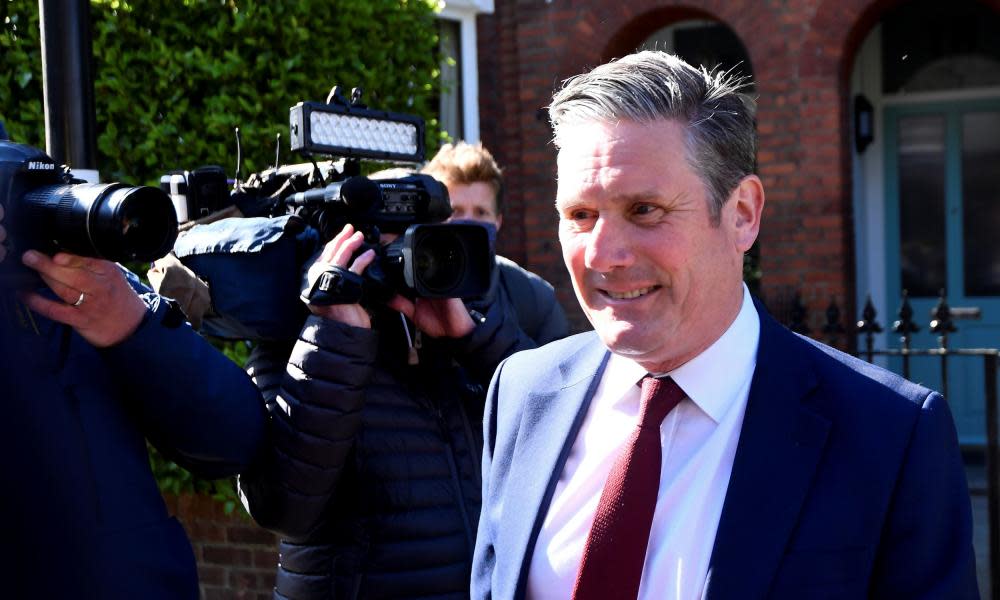Briefings, silence and sackings: Labour’s confidence in Keir Starmer slips

In the aftermath of Labour’s crushing general election defeat in 2019, Keir Starmer’s appeal to despondent party members and MPs was – as one said at the time – as a “comfort blanket”.
Decent, serious and unencumbered by baggage from Labour’s factional forever-war, many hoped he would polish the party’s image and build an election-winning machine, without ditching many of the policies of the Jeremy Corbyn years.
After a chaotic 48 hours of briefings and counter-briefings, sackings and silences, many senior party figures were asking themselves on Sunday whether their confidence had been misplaced.
Starmer’s team were acutely conscious in advance that early results from Thursday’s bumper round of elections would be the toughest for them – kicking off with the Hartlepool byelection but including many challenging English councils too.
But the scale of the defeat in Hartlepool still appears to have taken them by surprise. The Labour leader declined to answer questions as he left his north London home on Friday morning, having previously said he would “carry the can” for his party’s performance.
It was late afternoon before he emerged into the public eye. Giving a brief interview in a book-lined office, he conceded: “Very often we’ve been talking to ourselves, instead of to the country, and we’ve lost the trust of working people, particularly in places like Hartlepool. I intend to do whatever is necessary to fix that.”
By Saturday evening, the electoral picture looked very different, with Labour back in government in Wales and mayors Andy Burnham and Sadiq Khan both comfortably returned to power.
But by that point the good news had been drowned out by a fresh bout of Labour infighting.
News of an attempt to sideline Starmer’s deputy, Angela Rayner – alongside apparently well-briefed reports that shadow chancellor Anneliese Dodds and other senior figures including the chief whip Nick Brown could be ditched – sent shock waves through the party.
Events on Saturday afternoon are disputed by both sides. Rayner’s team say the first they heard of a plan to remove her from the posts of national campaign coordinator and party chair was when they were phoned by journalists asking for comment on her demotion.
Starmer’s aides insist they were not the source of briefings that she would be sacked, though senior party sources did not dispute on Saturday evening that she wwould lose both roles.
Rayner and her backers reacted with fury, with one MP saying she had been “stabbed in the front” in a move that “beggars belief”.
Some suspected Lord Mandelson, the former cabinet minister who is known to discuss strategy with Starmer’s team, of being involved in the briefing. The Labour peer, who has given a series of interviews defending Starmer, dismissed that idea.
Other MPs pointed the finger at senior Starmer aides, whom some shadow ministers have long complained can be high-handed with frontbenchers.
Whatever the truth, what appears to have been an attempt to stamp Starmer’s authority on the party and shift the headlines away from Labour’s challenges in the red wall seemed to have precisely the opposite effect.
Burnham, fresh from celebrating his own electoral success, tweeted: “I can’t support this.” Others are known to have made their views clear to Starmer in private as the evening went on.
One source told the Guardian the Labour leader was warned by senior party figures that he could lose his majority on the party’s ruling national executive committee if he dumped Rayner.
By Sunday morning, the message from Labour HQ had changed dramatically, and the shadow Scotland secretary, Ian Murray, was sent out to tell Sky News that Rayner had in fact been offered a promotion.
But hours later, no details of this new role – or of the expected wider reshuffle – had been announced, and there was radio silence from Starmer’s office. Rayner’s supporters said she was still locked in negotiations with Starmer, with the knock-on effect of delaying the other changes to his top team.
Meanwhile, anxiety inside the party was shifting from the election results themselves to the handling of the aftermath by Starmer and the wider leader’s office. “If they ever had the plot, they’ve completely lost it now,” said one frontbencher.
Some frontbenchers felt frustrated and let down by the hostile briefings about colleagues, including the well-liked and amenable Dodds.
“At 7am yesterday, I would have said the chances of a leadership challenge were about 0% or as close to that as you could get,” said one exasperated Labour staffer. “By 7pm they were getting dangerously close to 100%.”
“It’s like they didn’t learn the lessons of what happened with Watson,” he said, referring to the attempt by Corbyn’s aides in 2019 to have the post of deputy leader abolished, which was withdrawn after a backlash, leaving the mischievous Watson politically rejuvenated.
There were hopes last night that Starmer would smooth things over with his deputy, polish off the reshuffle and get back on the front foot in time for a big week in the Commons, with the Queen’s speech on Tuesday due to set out the government’s plans for the coming months.
But few in the parliamentary Labour party believe he emerges from the past 48 hours with his authority enhanced. One Labour staffer warned: “The danger is, there are people who are very loyal supporters of his who are saying: ‘What on earth is going on?’”

 Yahoo News
Yahoo News 
